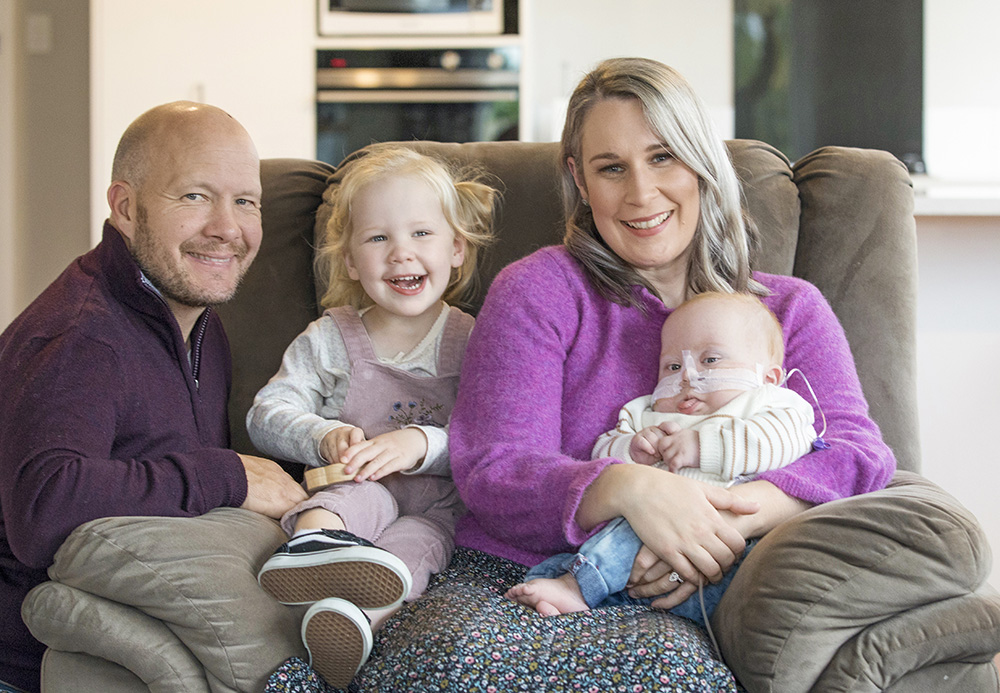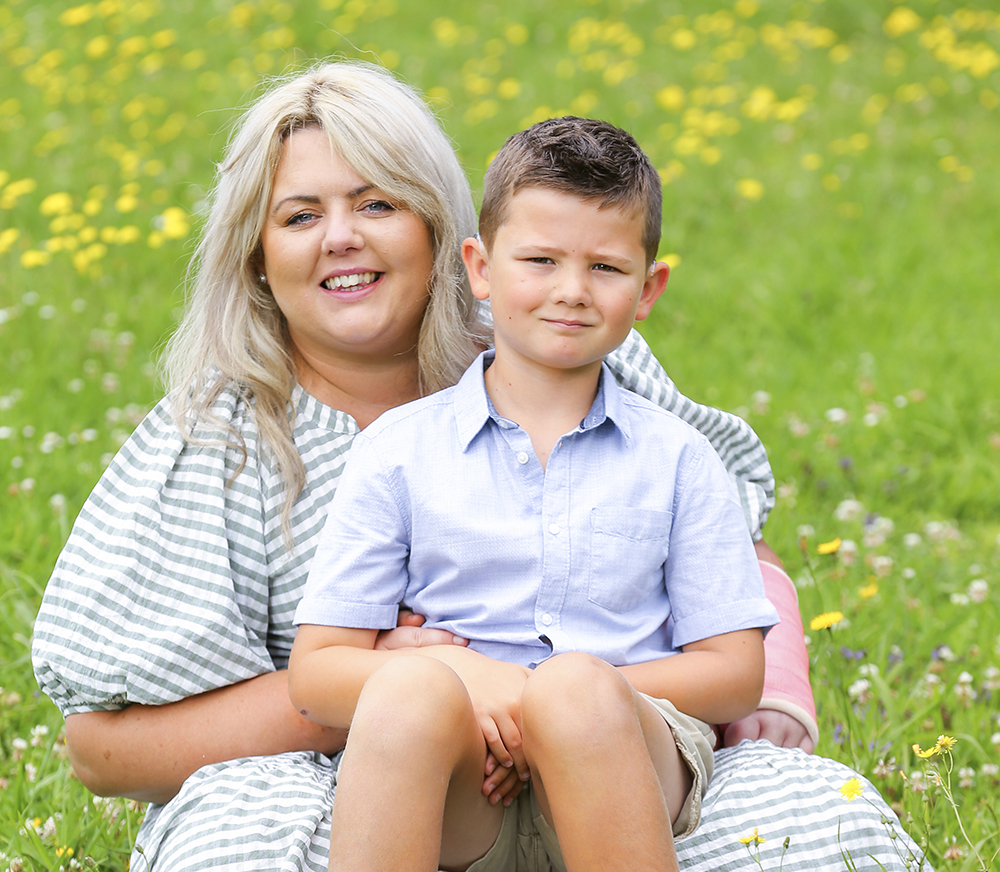On a Wednesday morning in March 2021, Louise Storey, a champion rower who represented New Zealand at the London Olympics and several World Championships, pulled into a car park next to a Cambridge petrol station for a phone call that would change her family’s life.
Louise (née Trappitt) had dropped daughter Ava, then two, at day care and was preparing to head for a scan that afternoon to see how her second pregnancy was progressing. Her husband, fellow Olympic rower John Storey, was training at Lake Karāpiro and was to join her later at the scan.
The call was from a paediatrician who matter-of-factly informed Louise that Ava had a rare chromosomal disorder – 1p36 deletion syndrome. Pamphlets and information documents were emailed through. Grappling with the news, the couple later headed to the scan.
“I remember not being able to feel any joy because of what we had just been told,” says Louise, 37. “We went into see the paediatrician, who ordered blood tests, but these were later cancelled by the geneticist because he didn’t think we had anything to worry about because 1p36 deletion syndrome is so rare. It’s just one of those random things.”

Mum and daughter share a sweet moment.
Two years on, at the home they’re temporarily sharing with Louise’s parents Ann and Dave, the couple – now also parents to 18-month-old Briar – sits on the couch to reflect on how life has changed since Ava’s arrival four years ago.
While Louise had retired from rowing in 2015, John, 35, was in what he believed was the best form of his life and was set to represent Aotearoa at the Tokyo Olympics in 2021. While he wanted to finish his career after the Games, his family came first and he retired just three months before the opening ceremony.
“Rowing had been my whole life,” he tells. “I spent my life building up to that point, but when you get that sort of life-changing news… After the first trial race, I knew my thought processes weren’t
right and I knew that I wasn’t performing at all. I felt worn out mentally as well as physically and I couldn’t perform.”

John in the Men’s Quadruple Sculls at the 2016 Olympics in Rio de Janeiro
“I would have supported John no matter what decision he made,” adds Louise, who met her English-born, Christchurch-raised husband in 2010, when she moved from Wellington to Cambridge to be closer to Rowing New Zealand’s headquarters.
The pregnancy with Ava was normal, and while she was quiet and pale when she was born in February 2019, she showed no signs of major health challenges. Louise recalls difficulties with breastfeeding, but these were sorted by the time they headed to Italy to support John as he trained for the 2019 World Rowing Championships four months later.

Louise at the London Games in 2012.
However, they suspected Ava had issues with her vision, so an appointment with an ophthalmologist was booked for when they returned. Nevertheless, while away, John and Louise were becoming increasingly aware something was amiss.
“But you talk to people and they say, ‘Every baby is so different and there is such a big range of development milestones, so don’t read anything into it,'” recalls John, who recently completed a PhD in biomedical engineering but has taken a mechanical engineering job in the Waikato to stay close to his family’s support networks.
“When Ava went for the eye test and she got glasses, we thought that was the problem – that her eyesight was causing the delay in her movement patterns. We thought the glasses would fix everything.”

Ava’s cheeriness masks a rare disorder.
But Ava continued to miss milestones and further tests were ordered, before a diagnosis of 1p36 deletion syndrome was finally made. The condition is caused by a genetic deletion, a loss of a segment of DNA, on part of chromosome 1. While it’s rare – estimated to affect one in every 5000 to 10,000 births – it has a wide array of traits, including delayed growth, hypotonia (low muscle tone), seizures, limited speech ability, hearing and vision impairment, and moderate to severe intellectual impairments.
Louise and John are now sharing their story as March marks the first Aotearoa Rare Disorders Month, bringing awareness to the more than 300,000 Kiwis who live with one of more than 6000 rare disorders.
Unlike most OECD countries, New Zealand doesn’t have a national strategy for rare disorders, which Rare Disorders New Zealand (RDNZ) is pushing for. Surveys show that more than half of people living with a rare disorder took longer than one year to get diagnosis and that for one in five, the time taken to get a diagnosis was more than 10 years.

During March, RDNZ has asked communities around Aotearoa to “glow up and show up” in recognition of a population that has been left in the dark for too long. Louise laughs as she shows photos on her phone of Rowing NZ’s women’s squad training in fluorescent tops, shorts and skirts in support.
She and John are pleased that RDNZ has released the booklet Raising A Child With A Rare Disorder to help parents and caregivers find their way along what can be a difficult and fraught path.
While Ava does not speak, she has learned some basic sign language, and is now walking and getting herself around. Louise and John say their girl loves music and singing, and has a wicked sense of humour and an infectious laugh that brightens all those around her. She also enjoys horse-riding through Riding for the Disabled and is a real water baby.

Louise’s parents moved to Cambridge so that she could return to work – she is now “Athlete Well-being Lead” for Rowing NZ – and so they could assist with Ava’s many weekly appointments.
“I sometimes say that Ava needs her own personal assistant,” says Louise, who returned to full-time work to ensure the family can save for Ava’s future. Asked what that looks like, she and John acknowledge nothing is certain, although they’ve been lucky enough to meet a nearby family with a child who lives with the same syndrome as Ava.

“She is an older girl who is talking, so we can start to see what a future for Ava might be like,” smiles Louise. “I just hope she’ll have friends who will do normal teenage things, like take her to the movies.”
To donate to Rare Disorders NZ, search for “GlowUpShowUp” at givealittle.co.nz. For more information or to download the Raising A Child With A Rare Disorder booklet, visit raredisorders.org.nz.
 Juliette Drysdale
Juliette Drysdale

